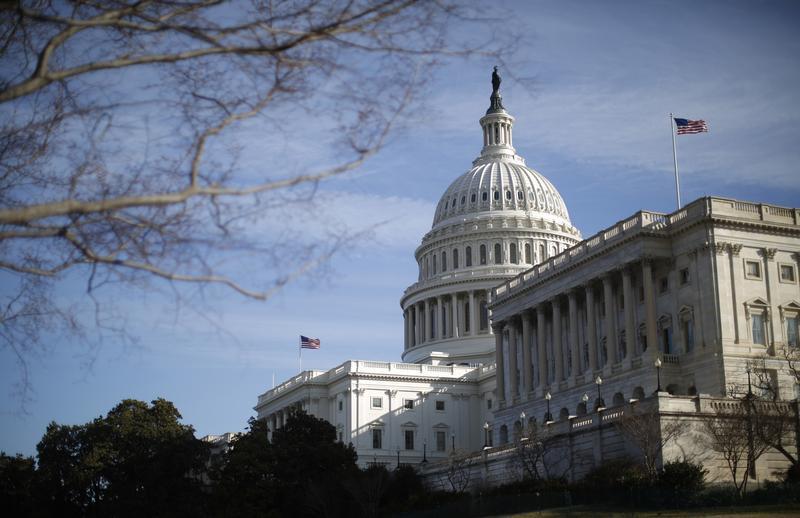Top Congressional Tax Writers Make Their Pitches
Although Senate Democrats and Republicans are roughly $1 trillion apart over how much additional revenue a new tax system should create, Senate Finance Committee Chairman Max Baucus, (D-MT), said "we will solve" that divide.
As to whether senior Democrats will get their $1 trillion in additional revenue, Baucus said, "I talked to Democratic leadership about the need for revenue. I can't give a number. I don't think it'll be that high." He added that "there has to be some revenue."
In response, Baucus' House counterpart, Ways and Means Committee Chairman Dave Camp (R-MI), would only endorse additional revenue as a result of increased economic growth.
"In the House, new revenue is not something we think is necessary, but I think the real focus of both of us is, get the policy right," said Camp.
Skeptics say tax reform, in Washington's current power structure, is largely unachievable. Baucus and Camp argue the current tax code is too inefficient and costly and there is growing demand to replace it. They point to support from businesses and President Barack Obama as evidence of its possibility.
Camp said he would welcome any opportunity to achieve tax reform, even if that meant attaching it to a government spending bill or a debt ceiling increase.
Baucus agreed, though insisted he is in line with other Democrats in demanding Congress increase the debt ceiling with no additional policies attached.
"I think it's more appropriate that we pass a clean debt limit ... But having said that, my major goal is to get tax reform passed," said Baucus. "It is very hard to predict what the right combination would be ... we'll be able to answer that question (in a couple more months)."
Camp disagreed, predicting tax reform will be an element in the debt ceiling discussions.
"Typically, debt limit has had policy attached to it," said Camp. "And I think we're going to see that discussion and debate."
Baucus and Camp, (R-MI), are continuing their nationwide push to overhaul the tax code. They visited payment-processor Square in San Francisco Monday and nearby Intel on Tuesday.
Tech companies, especially those specializing in software, have been among the most aggressive international tax planners, avoiding high United States taxes by keeping or shifting profits overseas.
To address this, Camp proposes exempting 95% of foreign earnings from U.S. tax, while imposing a one-time fee to return existing international profits.
Baucus generally supports Camp's international taxation approach. "We're in agreement ... we're not in a different place," said the Finance Committee chair. "Our goals are the same. I'm not going to quibble around the edges, but our goals are the same," he said.
The two tax chairman said they meet weekly and talk on the phone even more frequently. Both are planning to introduce tax overhauls in their respective committees. Despite the collaboration, the chairmen admit their products will be different.
"I think that when the House passes its bill, when Chairman Camp produces his bill out of committee, that'll be an opportunity for me and others to say 'good work, they're on the right track,'" said Baucus. "Frankly I'd expect the same when we come out with a bill," he said of Camp.
The Ways and Means Committee chairman is well ahead of Baucus in releasing details of his opening proposal. Camp calls for a top rate of 25%; a level tax experts said is only possible with eliminating or drastically reducing the most popular preferences.
Despite the skepticism, Camp said he is still committed to a top rate of 25%.
"I think you need to have a goal," said Camp. "I'm assuming that (a top rate of 25%) as I move forward."
Baucus failed to commit. "I'm not going to give a number. Nobody can give a number. It's early yet," he said.
Wherever the rate falls, taxpayers would have fewer deductions to claim under Baucus and Camp's proposed upgrade. During the 2012 presidential campaign, former Governor Mitt Romney floated a cap on all deductions. That would achieve a reduction in tax preferences, though add a layer of complexity to a tax code Baucus and Camp said they want to simplify.
"It's not been my preference," said Camp of a deductions cap. "We've been very careful not to make declarative statements about what the whole thing may look like."
The chairmen also largely dismissed moving to a pure flat tax, a system with one rate and no deductions.
Baucus called the idea "meritorious" because it is "rooted in simplicity." Though he said "A pure flat tax has the practical result of creating some winners and some losers ... those who are upper income earners would get big breaks."
"It's difficult to have one rate because, certainly of the disparities in income levels," said Camp. "We have a progressive tax system and I think for most Americans they would agree that's an appropriate tax system to have."
Baucus is retiring after this term and Camp is in his final year as Ways and Means Committee chairman. Both refused to predict where they will be at the start of the next Congress in January 2015. They would only say they expect to attend a presidential bill signing for tax reform by then. Still, many in Washington would take the other side of that bet.




















